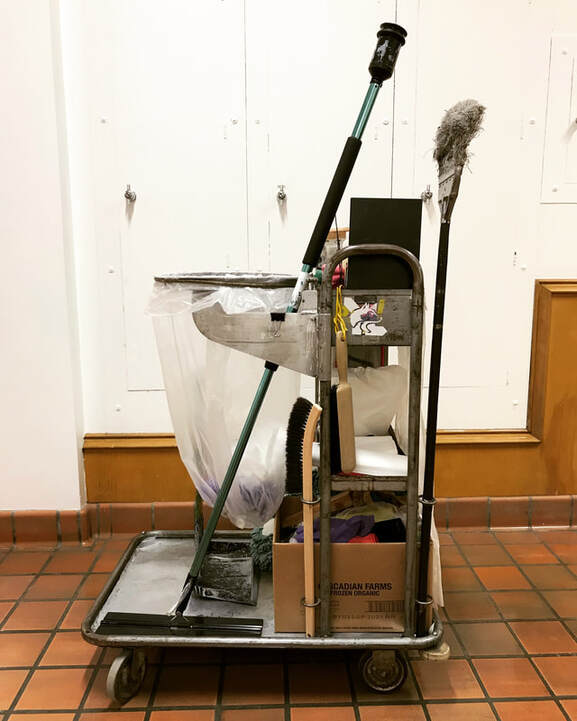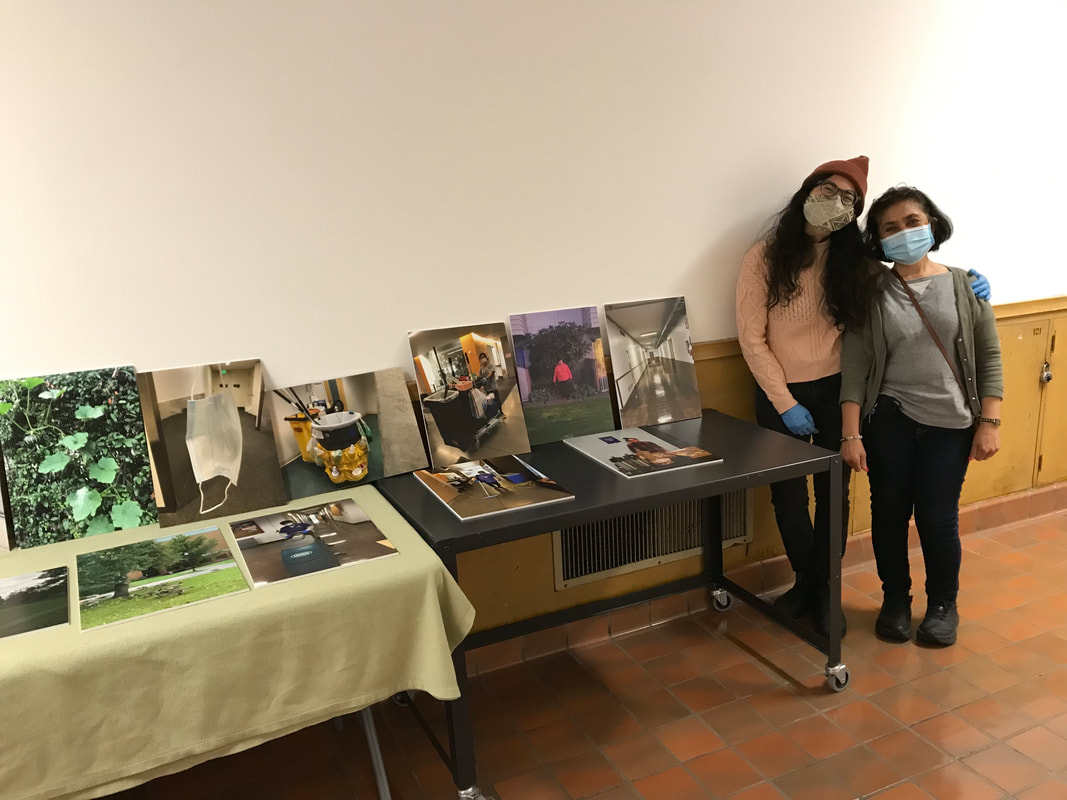The Custodian Project
 Evalynn's mom's trusty cart that she inherited from a good friend who retired. Evalynn's mom's trusty cart that she inherited from a good friend who retired.
|
The Custodian Project (formerly the University of Washington Custodian Project) is a community-driven, volunteer-led advocacy project. Through appreciation efforts, arts, and education, it aims to uplift custodian voices and wisdom, foster understanding and respect, and change culture and material conditions for custodians. Custodians work hard to keep our spaces clean and protect the health of our communities. This reality has not changed in the face of the pandemic. Custodians continue to be at the frontlines of keeping our communities safe and running. Many custodians are immigrants, refugees, and people of color who, because of long-standing systemic health and social inequities, are at increased risk of getting sick and dying from COVID-19. It is important for the community to acknowledge and respect custodians' work, and to learn how they can best support custodial staff, especially during this time of COVID-19. The Custodian Project is a volunteer-led effort and not organized by the University of Washington. |
(in)Visibility : UW Custodian Photo Exhibit
|
UW School of Social Work
Sept. 19 - Jan. 4, 2022 Othello-UW Commons Aug. 28 - Sept. 18, 2022 Spring Quarter: Health Sciences Building Apr. 18 - Jun. 10, 2022 *Extended until June 28* Winter Quarter: UW Tower Jan. - Mar. 2022 Fall Quarter: UW Art Building Sept. 28 - Dec. 10, 2021 |
While often overlooked and underappreciated, custodians are the protectors of our shared spaces.
(in)Visibility is the result of an 18-month journey - beginning as a volunteer appreciation effort, and eventually leading to a photovoice research and advocacy project for improved health and recognition for University of Washington (UW) custodians in the context of the COVID-19 pandemic. There are approximately 250 custodians employed by UW. Custodians perform a wide variety of tasks, from mopping floors to removing trash and recycling, to cleaning surfaces and disinfecting labs. This reality has not changed in the face of the pandemic. Custodians have continued to be at the frontlines of keeping our communities safe and running. At UW the majority of custodial staff are immigrants, refugees, and people of color who, because of long-standing systemic health and social inequities, are at increased risk of getting sick and dying from COVID-19.
This exhibit features photographs taken September to October 2020 by 16 custodians who shared stories about the health impacts of their workplace, neighborhoods, and homes. You are invited to walk in the shoes of the artists and bear witness to all aspects of their lives from early morning commutes to freshly waxed floors, coffee breaks to home gardens, songs of worship to fitness. Artists highlight how their work is challenging yet gratifying--a golden thread throughout the photographs and stories is the pride that custodians have in their work; they are the eyes and ears of our institution as the guardians of our health and safety. Artists and their stories are indicated by their initials in order to protect their identities.
This exhibit was made possible through the passion and advocacy of Evalynn Fae Taganna Romano, a daughter of two UW custodians and recent Master of Public Health and Master of Social Work graduate. Driven by a commitment to her community, Evalynn has advocated for consistent PPE, hazard pay, and other protections for custodians during the pandemic.
(in)Visibility is the result of an 18-month journey - beginning as a volunteer appreciation effort, and eventually leading to a photovoice research and advocacy project for improved health and recognition for University of Washington (UW) custodians in the context of the COVID-19 pandemic. There are approximately 250 custodians employed by UW. Custodians perform a wide variety of tasks, from mopping floors to removing trash and recycling, to cleaning surfaces and disinfecting labs. This reality has not changed in the face of the pandemic. Custodians have continued to be at the frontlines of keeping our communities safe and running. At UW the majority of custodial staff are immigrants, refugees, and people of color who, because of long-standing systemic health and social inequities, are at increased risk of getting sick and dying from COVID-19.
This exhibit features photographs taken September to October 2020 by 16 custodians who shared stories about the health impacts of their workplace, neighborhoods, and homes. You are invited to walk in the shoes of the artists and bear witness to all aspects of their lives from early morning commutes to freshly waxed floors, coffee breaks to home gardens, songs of worship to fitness. Artists highlight how their work is challenging yet gratifying--a golden thread throughout the photographs and stories is the pride that custodians have in their work; they are the eyes and ears of our institution as the guardians of our health and safety. Artists and their stories are indicated by their initials in order to protect their identities.
This exhibit was made possible through the passion and advocacy of Evalynn Fae Taganna Romano, a daughter of two UW custodians and recent Master of Public Health and Master of Social Work graduate. Driven by a commitment to her community, Evalynn has advocated for consistent PPE, hazard pay, and other protections for custodians during the pandemic.


